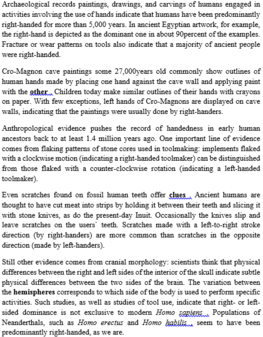Read the following passage and mark the letter A, B, C, or D on your answer sheet to indicate the correct answer to each of the questions.
Herman Melville, an American author best known today for his novel Moby Dick, was actually more popular during his lifetime for some of his other works. He traveled extensively and used the knowledge gained during his travels as the basis for his early novels. In 1837, at the age of eighteen, Melville signed as a cabin boy on a merchant ship that was to sail from his Massachusetts home to Liverpool, England. His experiences on this trip served as a basis for the novel Redburn (1849). In 1841 Melville set out on a whaling ship headed for the South Seas. After jumping ship in Tahiti, he wandered around the islands of Tahiti and Moorea. This South Sea island sojourn was a backdrop to the novel Omoo (1847). After three years away from home, Melville joined up with a U.S. naval frigate that was returning to the eastern United States around Cape Horn. The novel White-Jacket (1850) describes this lengthy voyage as a navy seaman.
With the publication of these early adventure novels, Melville developed a strong and loyal following among readers eager for his tales of exotic places and situations. However, in 1851, with the publication of Moby Dick, Melville's popularity started to diminish. Moby Dick, on one level the saga of the hunt for the great white whale, was also a heavily symbolic allegory of the heroic struggle of man against the universe. The public was not ready for Melville's literary metamorphosis from romantic adventure to philosophical symbolism. It is ironic that the novel that served to diminish Melville's popularity during his lifetime is the one for which he is best known today.
According to the passage, Melville’s early novels were__________.
A. published while he was traveling
B. completely fictiona
C. all about his work on whaling ships
D. based on his travel experie


Đáp án D
Theo như đoạn văn, những cuốn tiểu thuyết đầu tiên của Melville:
A. được xuất bản trong khi ông đang đi phiêu lưu.
B. hoàn toàn là hư cấu.
C. tất cả đề nói về công việc săn cá voi.
D. dựa trên những trải nghiệm của ông qua các chuyến hành trình.
Dẫn chứng ở câu thứ 2 đoạn 1: “He traveled extensively and used the knowledge gained during his travels as the basis for his early novels” – (Ông đã đi chu du nhiều nơi và sử dụng những kiến thức có được từ những cuộc hành trình để làm cơ sở cho những cuốn tiểu thuyết đầu tiên ).